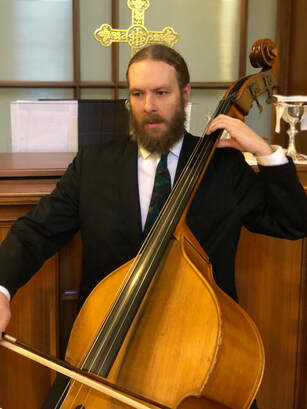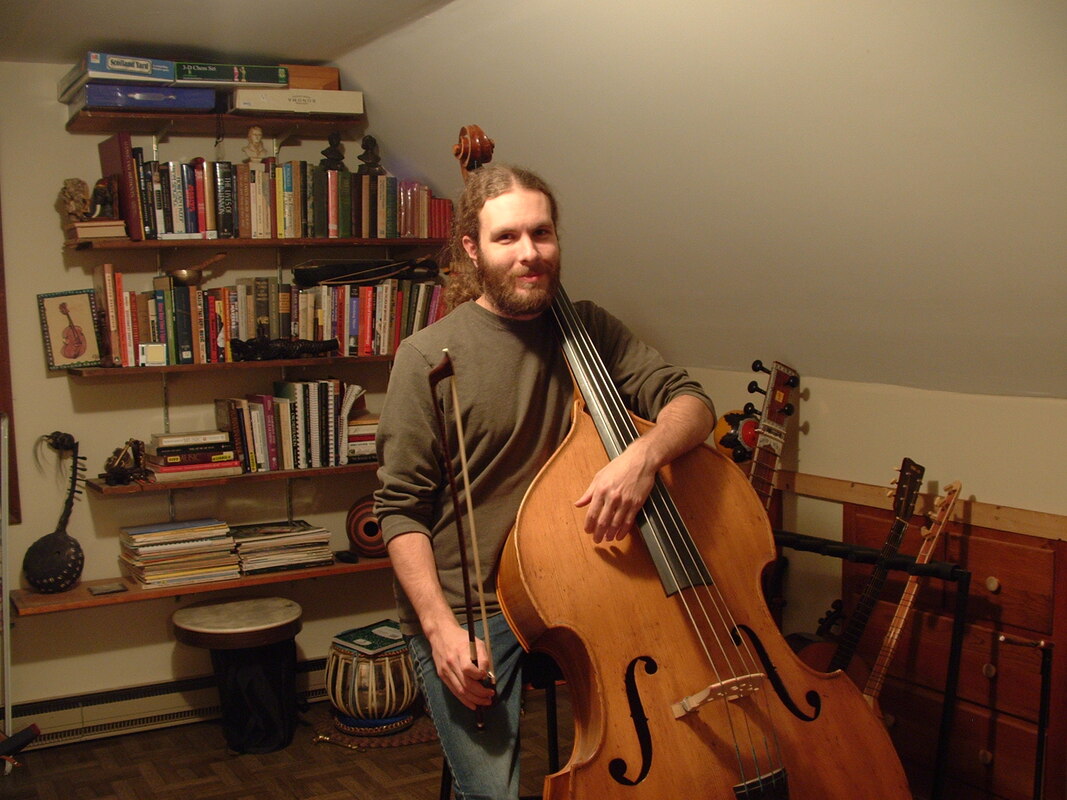 We've asked one of our bassists, Glen Schneider, a few questions in this installment of Member Spotlight! What was the first instrument you owned? I grew up with a piano and guitars in the home, but the first instrument that was specifically mine was a horrible Kramer electric bass with a warped neck that I got from a neighbor. That was the instrument I learned on, playing along to songs we taped off the radio with my brother. How did you come to study your instrument, and what drew you to it? My high school didn’t have an orchestra, we had a concert band. I had auditioned to be a part of the jazz ensemble on electric bass, and began spending time in the band room. In one of the back rooms, I discovered a double bass hidden away in an old canvas sack. I had never seen one before, and wanted to try it out. The band teacher told me I could use it if I joined the concert band and agreed to take lessons. After that, he connected me to my first teacher, Eliot Porter, who opened up the whole world of classical music to me and I was hooked. What is some of your favorite repertoire? I really like the solo bass pieces composed by Giovanni Bottesini. It’s extremely challenging stuff, but also very expressive and beautiful. For orchestral works, I love anything by Beethoven, Schubert, or Tchaikovsky. My tastes are sort of all over the place, and I enjoy playing all kinds of music in ensembles. From a listening perspective, or in terms of general appreciation, I really like the pieces written by Ravi Shankar for small ensembles of Indian instruments. His daughter Anoushka has also written and performed several works in that style as well. I saw her in concert at the Park Theater several years ago and I think that was the best performance I’ve ever seen. Who have been some of the most influential people in your life? Certainly all of my teachers. Without their enthusiasm and inspiration, I may never have taken any interest in music at all! That starts with my piano teacher, David Longo, high school band teacher Marc Blanchette, bass teachers Eliot Porter and David Cobb, and the music faculty at Rhode Island College at the time, especially Dr. Markward. My brother Jeff was my main inspiration when we were younger. He is six years older than I am, and I spent so much of my youth looking up to him and trying to keep up as he learned to play guitar. My fellow students at RIC were, and continue to be, also extremely influential and inspirational to me. Those include our concertmaster Wendy Rios, Erin Quinton, Alicia Ruggiero, Jacob Stott, Chris Farias, Chris Mink, Tom Casale, and too many others for me to list. What, for you, is the most fulfilling aspect of your life as a musician? I’ve been very fortunate to have been in several different roles, and in a wide variety of styles and contexts around music. They all have aspects that I really enjoy, but I think the most fulfilling thing for me is being a part of acoustic ensembles that perform live and in person. The creative process of thinking through the music, both in terms of determining how it should sound and technically how to achieve that sound and feel, is my favorite part. In that sense, rehearsals are the most enjoyable and interesting part of the process, for me. I love the fact that all the musicians have to juggle and balance the complicated task of playing their own parts while also supporting and enabling each other. Are there any performances or moments in your performing career that stand out in your memory for their significance? Could you tell us what made these performances particularly special for you? In 2004, as part of my graduate studies, I attended the 25th anniversary celebration of Gamelan Sekar Jaya, the first Balinese gamelan ensemble in America. They arranged a week-long program of study with master teachers from Bali, and we all stayed together on a small ranch north of Marin County in California. Learning from those teachers, getting to understand their creative process and the spiritual and cultural values that the music contained was really special and I wouldn’t trade it for anything. On the final day, we held an open celebration and performance. Although we weren’t playing at an extremely high level, it was the culmination of a really special experience that I will never forget. What would be your dream concert to perform? If it ever becomes possible, and I do hold hope that one day it will, I would love to be a part of a performance of Charles Stepney’s symphony, “Cohesion.” He had written it specifically for Minnie Riperton and the Ramsey Lewis Trio as soloists, accompanied by symphony orchestra. It was performed perhaps twice around 1970, once led by Stepney himself in Minneapolis and once by Seiji Ozawa (though I don’t know with what orchestra). It was recorded at the time, but the recording, and perhaps even the score itself, are now lost. What CD or playlist is in your car? I actually don’t listen to a lot of music in the car, I prefer to listen to NPR. However, when I do feel like listening to music while I drive, I go to the Talking Heads (especially “Stop Making Sense”) and early Parliament/Funkadelic. And lastly, could you tell us a bit about upcoming musical projects outside of COBSJ that you are looking forward to? Unfortunately, I don’t have a lot of stuff upcoming. At least, not at the moment. But, I am working on making a recording of Edouard Nanny’s “Dragonetti” double bass concerto. At least the slow, middle movement. I don’t have any particular timeline for it, only whenever I can play it well enough to record! I look forward to all of our COBSJ performances, that’s enough for me.
0 Comments
Leave a Reply. |
Archives
July 2022
Categories |


 RSS Feed
RSS Feed